Storm Babet: Bent steel doors and tens of thousands of pounds worth of damage as Brechin continues clean-up
Scotland’s rural community is looking at hundreds of thousands of pounds worth of damage costs as the clean-up continues one week after Storm Babet wreaked havoc on parts of the country, leaving three people dead.
Record water levels were reached in Brechin, Angus, where the River South Esk burst its banks and crept up to a staggering 4.4m above normal levels, the local council said.
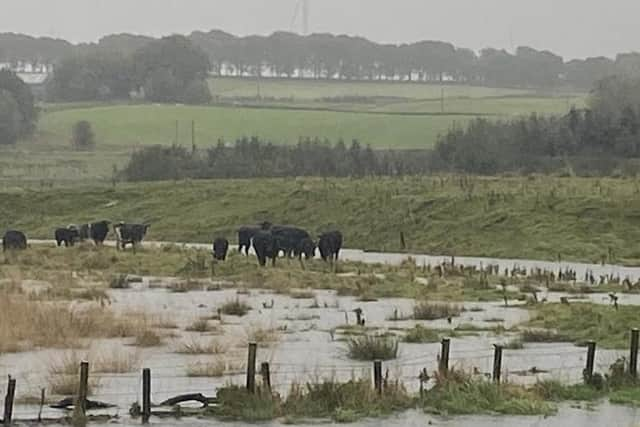

Advertisement
Hide AdAdvertisement
Hide AdHundreds of people had to be evacuated from their homes, some of whom were still staying in hotel rooms days later because of the damage caused. Businesses were washed out, and farmers lost livestock in the fast flowing floodwater.
Willie Reekie, who manages potato merchant A.J Allan in Brechin, has been working from his truck temporarily after the exceptional levels of rainfall washed out the company’s office.
"My neighbours who were here when it happened said you could hear the water coming,” he told The Scotsman.
"It happened in the middle of the night, but I didn’t come and see while it was dark as someone in the area had been killed by a tree falling down. I didn’t think it was worth it.
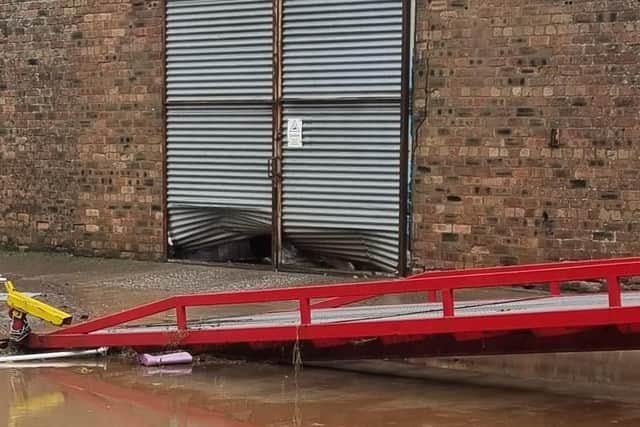

"The water bent four agricultural doors on the site, which are made with steel frames with corrugated iron sheets fitted through. It meant the office was submerged.
"It was amazing how much the water moved the desks around inside. It must have been some power and some wave that hit.”
Reekie said the potato crop had been surprisingly resilient and survived the bad weather, but it would take some weeks before business returned to normal.
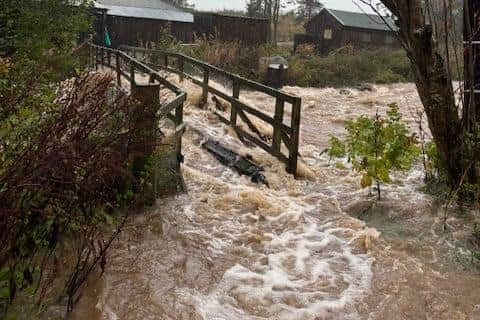

"We have spent about £30,000 this week already and that’s hardly touched some of the damage,” he said. “That’s just been to get us up and running again. I wouldn’t call it total devastation, but it’s close enough.”
Advertisement
Hide AdAdvertisement
Hide AdJette Mann, who works at Southesk Farms in Angus, said 500 acres of the estate’s farmland was under water and 12 houses on the property had to be evacuated.
More than a week later, some of the residents have been unable to return home because of the extent of the damage.
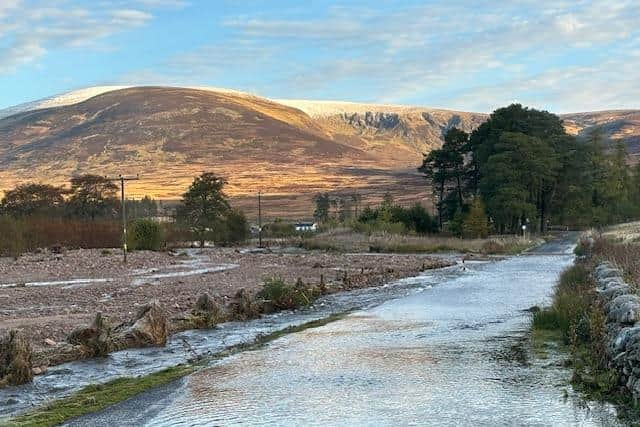

Mann said: "It works out at about 25 or so people who had to be evacuated. Our farm manager was out and about carting people about in tractors, trying to get them out safely.
"We put them all up in the Park Hotel in Montrose. Some of them have decided to come back and help with the clean-up themselves, but others are still at the hotel.”
For Dee Ward, owner of Rottal Estate in Glen Clova, the unprecedented rainfall levels caused widespread flooding, but also swept away a little bit of history.
A footbridge crossing the Rottal Burn, which he believed was installed in the 1880s and had survived flooding in previous years, succumbed to Storm Babet.
"It just shows you how powerful the water was this time,” he said. “The last couple of years the water has hit the bottom of the bridge, but it has been getting higher and higher.”
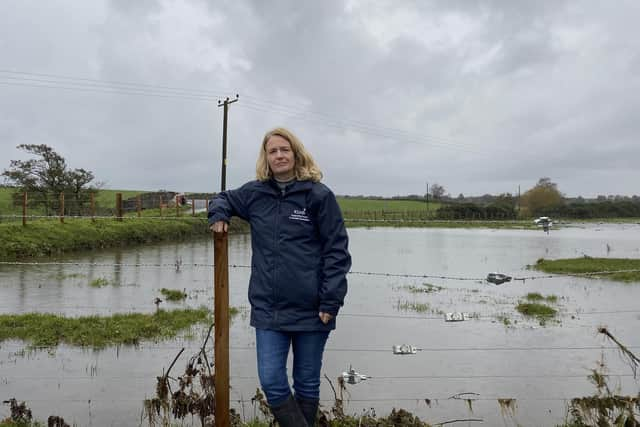

Because of the amount of water, the Rottal Burn ended up changing course and flowing down a road running through the estate, he said.
Advertisement
Hide AdAdvertisement
Hide AdHaving experienced £300,000 worth of damage on the estate recently during Storm Arwen in 2021, Ward said the Scottish Government needed to be more prepared for extreme weather, which would become “a frequent occurrence”.
“What I keep trying to say to the Government is we need to work out how to hold the water up with us,” he said.
"Brechin was badly affected, and if we can work out something that could be much more simple and cheap using a digger rather than spending all this money on flood defences, it will make a huge difference.
"We need to solve the problem of flooding in the hills. The damage is one thing, but we need to wake up to the fact this is going to become a frequent occurrence that we need to do something about it.”
Carol McLaren, chief executive of RSABI, which provides support to those working within the Scottish agriculture industry, said it was still too early to tell the total cost of damage for farmers.
"We have been in touch with one farmer who said he is looking at £100,000 worth of damage already,” she said. "Another farmer we have spoken to is getting counselling as well as financial support.
"Some farmers have lost stock because of the weather, which must be incredibly distressing. We know farmers do their absolute best to try and rescue the animals in these situations. It’s a tough time for them.”
It wasn’t all bad
But it is not all bad news for the rural community.
McLaren said RSABI had been moved by the amount of farmers across the country who had been keen to support those in the community who were worse hit by the weather.
Advertisement
Hide AdAdvertisement
Hide AdOne of those is Donald Ross, of Rhynie Farm in Easter Ross, who has donated bales of hay and silage.
"I was just about to go on holiday and I saw the bales floating down the river near Inverurie and thought ‘what can we do about this?’” he said. "It’s only the start of winter, and we don’t know what weather lies ahead and a lot of farmers will be really struggling.”
Ross said problems with stock would likely emerge later in February to April if there was a hard winter ahead.
"People will have feed at the moment, but they might not have enough to see them through because of the way the weather has been,” he said.
He pointed to existing support for the agriculture sector, including the RSABI, but encouraged farmers to communicate with one another during challenging times.
"The psychological affect the weather has is as bad as anything because it really gets you down,” Ross said.
"And it can be a lonely existence trying to get through it all. A lot of us just work by ourselves and you’re not communicating with people and it can get to you. If farmers have problems, they should be speaking, speaking to one another if things aren’t going well.”
First Minister pledges support for farmers
Earlier this week, First Minister Humza Yousaf met with members of the National Farmers Union Scotland (NFUS) to affirm his support for the agriculture community that had been hit hard by the flooding.
Advertisement
Hide AdAdvertisement
Hide AdMSP Rachael Hamilton, however, said she would “continue to urge” the Scottish Government to support farmers and crofters who had been devastated by the impact of Storm Babet.
She said farmers had been left to “carry the can” and rely on support from RSABI and Forage Aid.
The Scottish Tories’ rural affairs spokesperson said: “Storm Babet has devastated farmers and crofters across the communities where it hit hardest and the recovery for them will not happen overnight.
“That is why I pressed the SNP-Green Government on their commitment to supporting our farmers and crofters, who are already experiencing extremely tough times right now during the global cost-of-living crisis.
“They have been left to carry the can in the aftermath of Storm Babet and have been left to rely on support from outwith government. They simply must be part of any resilience review the SNP-Green government undertake in the wake of the storm.”
Hamilton urged justice secretary Angela Constance, who chairs the Scottish Government’s resilience room, to commit the Scottish Government to ensuring farmers and crofters formed part of any Storm Babet resilience review and that food supply chains and food producers were protected in the future.
In response, Ms Constance said rural affairs secretary Mairi Gougeon was in regular contact with NFUS president Martin Kennedy and there was a recognition within the Scottish Government that farmers were on the “frontline” in the fight against climate change, and their views must be heard, given the likelihood of future weather events.
Elsewhere, Angus Council said its staff were continuing to assess and communicate with partners to warn and inform its communities as it responded to the weather warnings, which included assessing areas impacted by Storm Babet.
Advertisement
Hide AdAdvertisement
Hide AdA spokesperson said: “We ask our communities to bear with us and the many other organisations, including volunteers, who are focused on the recovery phase of Storm Babet, while preparing for the winter ahead.
“Angus Council and our partners are working hard to maintain normal services, while prioritising the immediate needs of those who have been traumatised, made homeless and who have lost everything.”
Ross Rankin, supervisor at the Brechin Community Campus, which was temporarily set up as a rest centre to house people who were evacuated during the worst of the flooding, said the town was still getting back on its feet.
Most businesses have been able to reopen. However, traffic flow is still disrupted because of damage caused to roads in and out of the town.
Brechin bridge is still closed due to the foundations having been damaged, while a road connecting Marykirk, Angus, where some houses were evacuated also collapsed.
"The traffic in Brechin reached a standstill this week with HGVs and other traffic trying to get through because of various road closures,” Rankin said.
"The roads are starting to open back up though. We’re getting there.”
Comments
Want to join the conversation? Please or to comment on this article.
